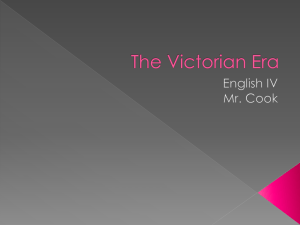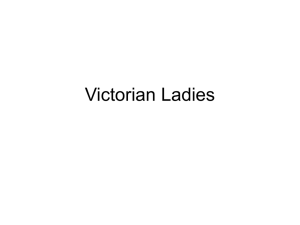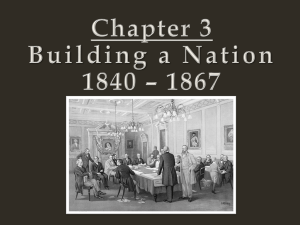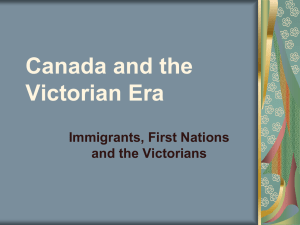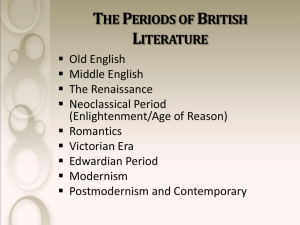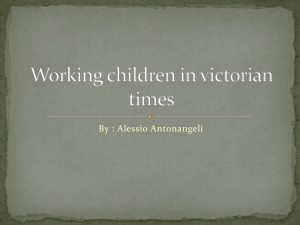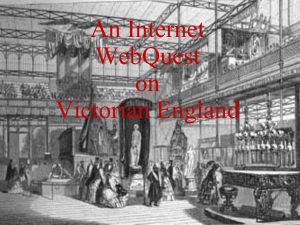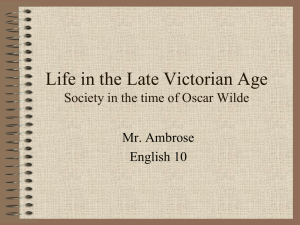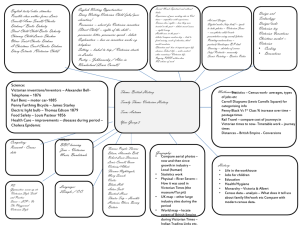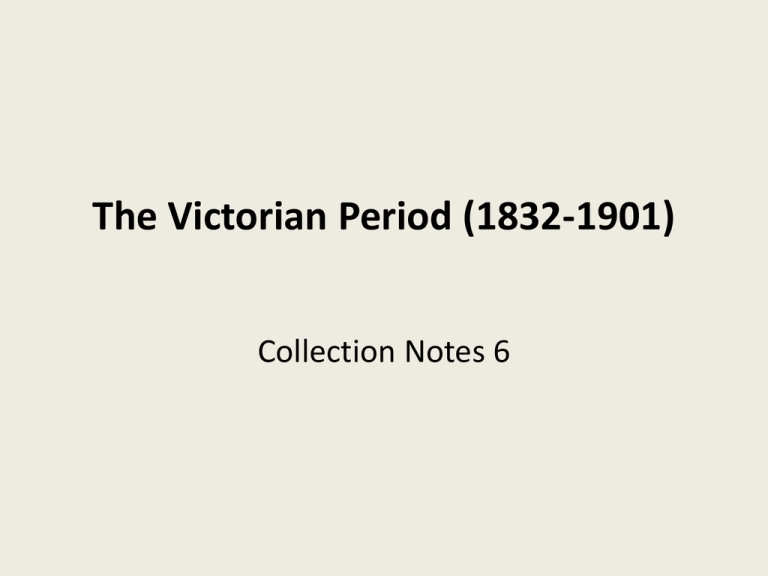
The Victorian Period (1832-1901)
Collection Notes 6
• Victorian Period (1832-1901) Collection Notes
from your text
• What social and political factors affected life in
Victorian England?
• What did Victorians value?
• How did discoveries in science affect people’s
beliefs?
• How did Victorian writers respond to issues of
their time?
• What social and political factors affected life in
Victorian England?
• Queen Victoria’s Reign (1837-1901)- time of
political and social stability were the result of
conditions that began before Victoria and most of
her subjects were born.
• After Napoleon’s defeat at Waterloo in 1815
Britain was not involved in a major European war
until WWWI began in 1914
• Empire that started in the 17 and 18th century
with British interest in India and North American
grew and by Victoria ‘s reign there were 200
million subjects living outside of Great Britain
• Industrial Revolution of the 18 century had
expanded. Growing industry and jobs for the
new middle class. New class brought about
social and economic changes were expressed
in gradual political reform and working class
politicians and voters achieved political power
while leaving monarchy and aristocracy in
place.
• 1840- first decade of Queen Victoria’s reign
was known as the Hungry Forties. 1.5 million
unemployed workers and their families were
on some form of poverty relief.
• Children worked in factories.
• Ireland potato blight (1845-1849) famine
killed million people and forced two million
25% of the population to emigrate.
• Rapid growth of cities made them filthy and
disorderly due to lack of city planning to
accommodate nearly 2 million people
• Violence broke out at political rallies called in
the 1840s to protest policies that kept food
prices high and deprived working men and ALL
women the right to vote.
• 1848 the political climate had caused the
government to army themselves in fear of a
revolution.
• 1850s food prices started to drop again due to
the increase in trade with other countries and
the diets of the middle class improved (fruit,
meat, and margarine) were stables for the
working class.
• Factories and railroads made services and
goods such as postage, newspapers, clothing,
furniture, travel and other goods and services
cheap.
• 1828 Universal adult suffrage in 1928 extended
the vote to women at age 21
• 1832 First Reform Bill extended the vote to all
men who owned property worth 10 pounds or
more in yearly rent.
• 1867 Second Reform Bill gave the right to vote to
most working class men except for farm workers.
• 1870 state supported schools were established
1880 made compulsory and free in 1891
• 1918 women 30 yrs old and older won the right
to vote.
What did Victorians value?
• Attitude of the middle-class Victorians
towards government history and civilization.
History=progress
• Progress=material improvement could be seen
touched counted and measured
• Valued cleanliness and order
• Middle class believed that things were better
than in the past.
• Victorian Society was concerned with making
sure that things were morally and
intellectually appropriate.
• Wording was altered in publications to
eliminate the “blush “that it might cause a
reader.
• In art and fiction sex, birth, and death were
softened by sentimental conventions (tender
courtships and old people were saints and
babies angels)
• Victorian society regarded seduced or adulterous
women as “fallen” but not their male partners.
• Victorian society did not want a strong authority in
their central government but fathers in middle-class
households were the power figures in fact and fiction.
• Women were subject to male authority and were
expected to make their homes comfortable for their
husbands. Women who did not marry had few options
and men sometimes postponed marriage due to the
fact that they could not afford it.
• Prudery and social order were intended to control the
immorality and sexual excesses that Victorians
associated with chaos and the regency of George IV
(1811-1820)
• How did discoveries in science affect people’s
beliefs?
• Intellectual advancements during this age
caused advancements in science through the
works of Charles Darwin and his theories
about the evolution of species.
Industrialization of England supported
science, technology, chemistry, and
engineering
How did Victorian writers respond to
issues of their time?
• In the first half, writers complained that
materialist ideas of reality completely
overlooked the spirit or soul that made life
beautiful and just.
• Some in the Victorian age reassured their
readers that the world was” right” while
others asked them to consider whether
human life and the natural world made as
much sense as they had once hoped.
• Charles Dickens is considered the most
popular author from the Victorian age. His
works depicted how people were being
abused, neglected, and abused. A Christmas
Carol shows this and also shows how material
wealth does not buy a peaceful existence.
• Victorian bride and
groom.
Flaming June by Lord Leighton 1895
Ophelia by John Millias
1852
• Some writes of this time believed in a higher
power and others began to question.
However, the writers were writing for the age
in which they lived.
• “ (Victorian writers) …sent their words to
work in the world to alter, to reinforce, to
challenge, to enlarge, or to temper the ideas
and feelings with which their contemporaries
managed their lives.
QUIZ!! Write the question and answer.
• What social and political factors affected life in
Victorian England?
• What did Victorians value?
• How did discoveries in science affect people’s
beliefs?
• How did Victorian writers respond to issues of
their time?


